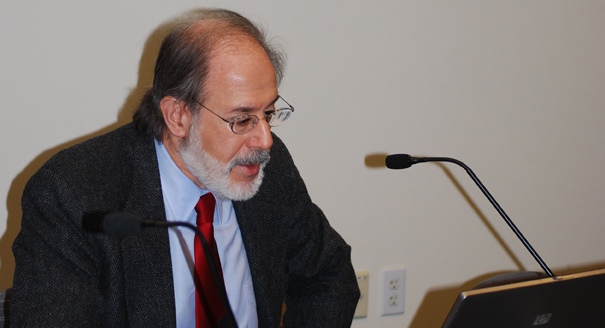Registration
Thank you!
You will receive an email confirming your registration.
IMGXYZ3520IMGZYXIn August 1991 and again in the aftermath of the December 2011 Duma elections, broad protest movements appeared across Russia. Yet the Russian and Western media have focused overwhelmingly on developments in Moscow and St. Petersburg. Dr. Harley Balzer, associate professor of government and international affairs at Georgetown University, discussed the widespread character of protests across Russian regions and argued that the ongoing protest movement has seriously damaged Putin’s legitimacy. Carnegie’s Matthew Rojansky moderated the discussion.
A Brief History of Protests in Russia
- Imperial and Soviet Russia: Protests and political upheaval occurred in waves of rapid mobilization and demobilization throughout Russian history, argued Balzer. The early Stalinist era saw mass protests against collectivization and armed resistance against the Soviet takeover of Central Asia. Protests continued in the Khrushchev and Brezhnev periods and increased in number during the later years of perestroika, he added.
- August 1991 Coup and Yeltsin Era: Even though Moscow is most closely associated with the anti-coup protest movement, crowds were actually larger in Leningrad, said Balzer. Large rallies also took place in cities like Nizhny Novgorod, Saratov, Tomsk, and Vladivostok on August 19 and the days after. In the end, he explained, a combination of popular resistance, media subversion, and inertia thwarted the coup plot. Protests against Yeltsin in the 1990s were extensive but not aimed at overthrowing the regime.
- Putin Era: During Putin’s first term, protests all but disappeared due to the devaluation of the Russian ruble, reforms begun by Yevgeny Primakov, and rising oil prices, said Balzer. However, in the 2003 and 2004 elections more people voted "against all" and new protests focused on specific issues started to emerge. After 2008, protests grew against a range of issues such as deforestation, import tariffs on foreign automobiles, and the slow government response to contain wildfires.
The Current Protests
- Warning Signs: Putin’s regime failed to heed warning signs leading up to the December 2011 protests, argued Balzer. In 2005, benefits reform protests took place in 80 of Russia’s 89 regions. In 2011, Mikhail Dmitriev, President of the Center for Strategic Research, published two reports that warned of growing discontent in Russian society. Most recently, in November 2011, Putin was publicly booed at a fighting match broadcast on national television.
- The Turning Point: Putin and Medvedev’s announcement at the United Russia conference last September that they would swap places was “a serious miscalculation” by the elite, said Balzer. This decision, taken without consulting Russian citizens, coupled with the fraudulent Duma elections on December 4 and the use of insults against protestors fueled popular outrage.
- Discontent in Russia’s Regions: Although the largest protests have occurred in Moscow, sizeable crowds have also gathered in other cities like Samara, Ekaterinburg, and Saratov to express their frustration with Putin’s government, said Balzer. Protests outside Moscow are probably larger than they were in 1991, he added, since Russian citizens are no longer afraid to demonstrate in public and can easily organize protests through social media. The diverse crowds that have gathered in provincial cities have developed their own creative ways of mocking the regime without coordinating with each other. Despite their different political affiliations, protestors across Russia are demanding new parliamentary elections and free and fair presidential elections, he concluded.
- Power of Satire: Protests and posters ridiculing Putin have begun to change people’s opinion of the regime, said Balzer. The protestors’ willingness to design posters themselves and brave subzero temperatures shows that many Russian citizens are taking personal initiative. Peaceful demonstrations and humor are slowly undermining the authority of the regime and empowering ordinary people. “The enthusiasm of the anti-Putin crowd is palpable,” he concluded.
- The Kremlin’s Response: Putin’s initial reaction to the protest movement was to downplay its significance, but the mass public outcry clearly threatens his hold on power. Putin has relied on what Balzer called a “tried and true response” – holding pro-government counter-demonstrations and manipulating media coverage in his favor. Balzer noted that the regime has exaggerated the number of participants in pro-government rallies while playing down the size of opposition protests. Medvedev has so far refrained from making mass arrests or using force to disperse protestors, knowing that such moves could taint his presidency.
Putin’s Dilemma
- Crisis of Legitimacy: Carnegie’s James F Collins argued that Putin suffers from a lack of legitimacy heading into the presidential election. Putin’s inner circle is also starting to unravel, Balzer added. However, if Putin tries to shift his core support base, the “logic of cronyism” could cause him to lose valuable supporters. “Cronies are hedging their bets” by professing loyalty to Putin while simultaneously making connections with the opposition, he added.
- Uncertain Future: Although Putin will likely win the upcoming election, his political future thereafter remains uncertain. In contrast to previous protests, which largely focused on specific issues, protestors today are calling for regime change. A unified opposition movement with a viable candidate could possibly emerge in the next six years and challenge Putin in the 2018 election, Balzer argued. In the coming years, “Vladimir the Lucky” will be unable to count on the high oil prices that have traditionally maintained economic stability in Russia, he concluded.
